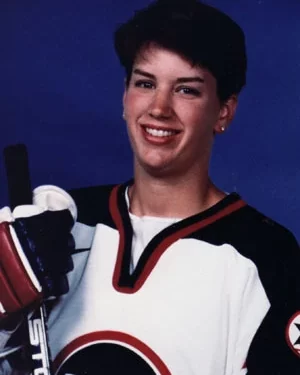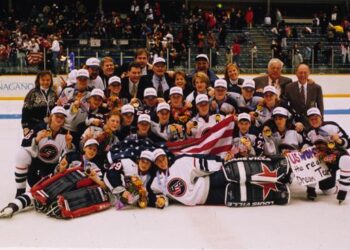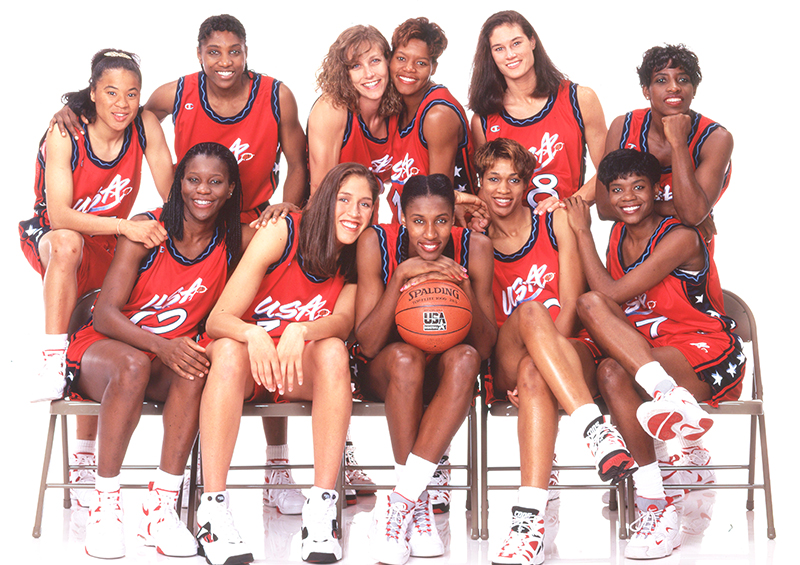By: Zachary Draves
Former US Hockey player Gretchen Silverman says that it is hard to believe that it’s been twenty five years since she and the US women’s team captured the first ever Olympic gold medal in women’s hockey at the Nagano games. At the same time for her, it feels like it was only yesterday.
“It is pretty crazy and when you think back to that time it seems so close, but when you look at life’s journey it feels both very recent and very long ago depending on which perspective” she said.
She holds the distinct honor of scoring the first ever goal in a women’s gold medal game when the US took on Canada for all the marbles. At the time, many saw Canada as the clear favorite going into the games considering that they had defeated the US on five out of six occasions including during the World Cup and Nation’s Cup.

(Courtesy: Denis Paquin/AP)
But after a dramatic come from behind victory over Canada in the final game of the round robin in which they won 7-4, the US team went into the medal round brimming with confidence. Eventually, they met Canada in the final and it was the stars and stripes that reigned supreme.
At the 22:38 minute, Gretchen got her chance and scored that historic first goal. When all was said and done, the US came out on top 3-1 and carved a place in the heart of aspiring hockey players everywhere, especially young women and girls.
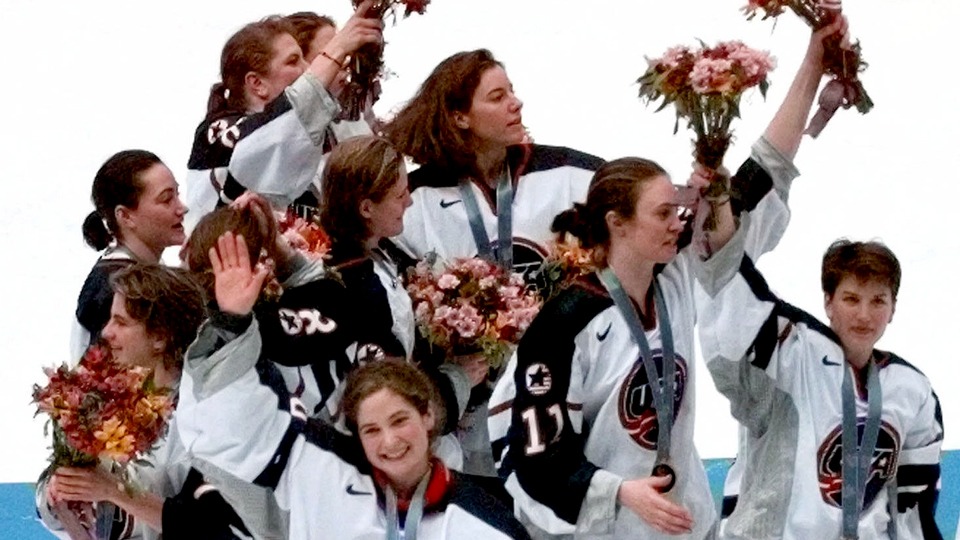
(Courtesy: United States Olympic and Paralympic Museum)
When asked if she takes enormous pride in being the first to score a goal in the biggest, Gretchen told Team NBS Media that looks at that feet through the lens of team play.
“At the time, you are not thinking of the historic elements,” she said. “Even now I don’t think of it like that. We were so focused on the team element.”
That humble philosophy is what has sustained Gretchen throughout her life and career.
Born on May 4, 1972 in Marlborough, Connecticut, Gretchen grew up looking to find her way with two older brothers and two older sisters. When she retrieved a pair of hand-me down ice skates from her mother, she had ultimately found her calling.
She was one of those kids who essentially learned how to skate before she could walk and found a home on the ice. But while her sisters were interested in the glam and pageantry of figure skating, Gretchen had a desire to follow in her brothers footsteps in the game of bruting force that is hockey.
At the time, opportunities for women and girls in sports were still very limited, but all that changed a month after Gretchen’s birth. In June, Title IX became the law of the land, which granted women and girls greater opportunity to participate in extracurricular activities.
Gretchen first played competitive hockey at the tender age of six, which was the minimum age requirement, and it was on an all-boys team.

(Courtesy: Gretchen Ulion SIlverman)
When she realized that those chances were starting to fade, she began to look elsewhere when she was 12-13. After seeing a women’s club team at the University of Connecticut, Gretchen wondered if that were all the chances that were afforded to her in the future.
With her mother’s backing, Gretchen found the Loomis Chaffee School, a prep school in Windsor, Connecticut and it was her saving grace. There she played for legendary coach Chuck Vernon and also found a female mentor in fellow player Judy Parish, who was a senior at the time.
Gretchen would follow Parish to Dartmouth College and became of the most decorated players as two time Ivy League Player of the Year and still holding the record for most goals in a season (49), most goals in school history (189), and most career points (312).
The US national team started in 1990 and four years later Gretchen would get her first crack at national glory. Having graduated from Dartmouth with a degree in history and economics and earning a master’s degree from Lesley College, she bounced around from various tournaments and tryouts while not fully solidifying her position on the team.

(Courtesy: Gretchen Ulion Silverman)
After the hiring of Coach Ben Smith, Gretchen found a coach who she said didn’t understand women’s hockey or her. Thinking she had placed her spot on the team given all that she had achieved at Dartmouth, Gretchen suddenly found herself cut from the team in 1994.
She was out of a job and the future looked bleak.
But it was during the process of soul searching that she went back to the foundation that made her love the sport in the first place. After becoming a full time teacher, she joined an all men’s team again and it was there that she met her future husband Steve Silverman. Slowly but surely she started to put things back together.
“That was kind of sad and frustrating time but I also kind of fell in love with hockey all over again and gained a whole new perspective,” she said.
Then in a moment of pure fate, her mother received an invitation in the mail from Team USA. Thinking that it was another US Visa Application form that was reguarly delivered to prospects, Gretchen told her mother over the phone to throw it away.
However, it was an invitation to try out for the 1998 Olympic team.
Still reeling from being cut, Gretchen wasn’t enthused about it and told her mother that she wasn’t going to go. But at the behest of her mother, a reluctant Gretchen was convicted to give it a shot and the rest is history.

(Courtesy: Gretchen Ulion Silverman)
To this day, Gretchen still is amazed by the sudden turn of events and uses that as an important teaching tool.
“The biggest what if I guess, ” she said. “Sometimes you can’t control when the opportunities come, you only have to prepare when it does.”
Another factor in helping her take a chance again was the acquisition of fellow Dartmouth player and goalie Sarah Tueting. Team USA was in search of a goalie and it was Ben Smith, who had cut Gretchen before and was named the head coach of Team USA, made a phone call to Dartmouth coach George Crowe.
It was during that call that George Crowe had mentioned Gretchen to which Smith replied “Gretchen who?” From there, Smith had to reconsider things and it turned out it was another phone call that helped turn the tide.
“I think about the call by Ben Smith about Sarah Tueting, ” said Gretchen. “Had it not been for that phone I probably would have remained lost in the shuffle.”
After the success at Nagano, the US team was welcomed back with an enormous showering of love and support. There was a visit to the White House, the coveted cover of the Wheaties box, and throwing out the first pitch at Yankee Stadium.

(Courtesy: USA Hockey)
That kind of recognition was beyond the pale for Gretchen but she was able to embrace it because of its eventual ripple effect.

(Courtesy: John Long/Hartford Courant)
“It was shocking, she said. “We pretty much played in anonymity. Our entire lives including college hockey we played in front of our parents and a few friends. To have women’s hockey front and center in the media, it was pretty shocking. I think really the biggest piece of that was to have the ability to meet young girls and they had an opportunity to play.”
The lasting effect of the ‘98 team was that enrollment in USA Hockey amongst women and girls soared to a record 74,000. Today, women and girls have a place in the game from youth to college to the Premier Hockey Federation, which is the first and only women’s professional hockey league.
As for Gretchen, she both taught and coached for ten years at the Taft School, a private boarding school in Watertown, Connecticut. In addition to teaching algebra, a dorm head, and an admissions officer, she notched 65 wins as head coach of the women’s hockey team including a 17-7 record in 2017-2018.

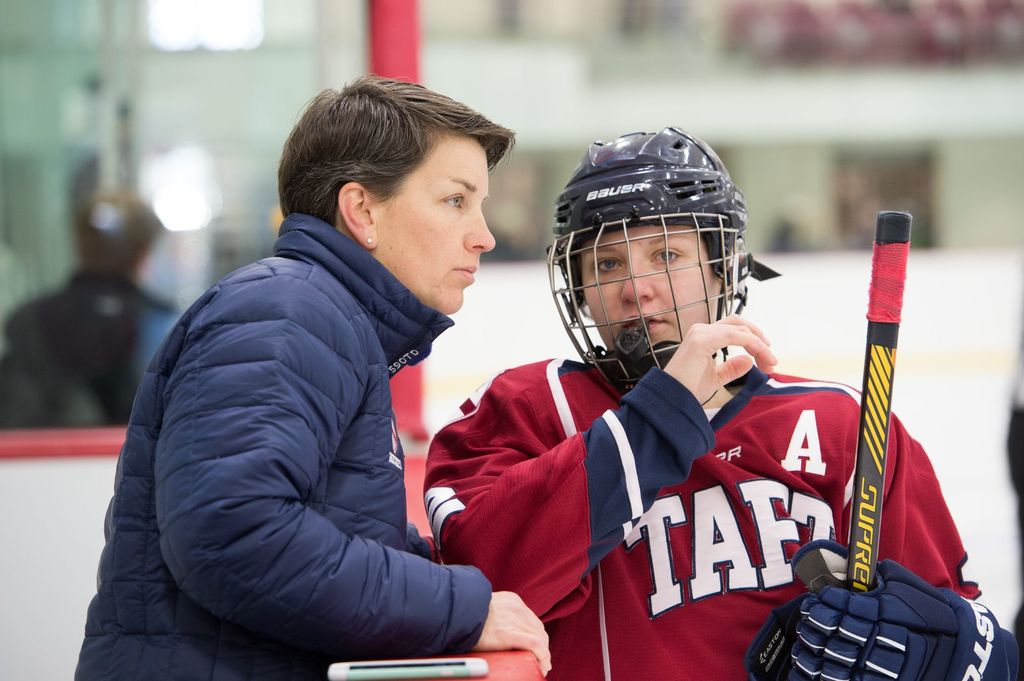
(Courtesy: Gretchen Ulion Silverman)
Today, she is the head coach at Post University in Waterbury, Connecticut.
Since its inaugural season in 2016-2017, the Eagles have not had a winning season yet and just ended this year with a 4-29-2 record. Gretchen is certainly looking to turn things around on the ice, but it is her focus on releasing the pressure to perform on players and going back to simply loving the game that fuels the fire.
“A lot has changed and I feel good that the expectations are higher for women and girls, but I feel as though we have lost the innocence that we had in 1998,” she said. “Social media and the pressure on kids to perform is completely different and at the end of the day I try to remind them that hockey is a game and it is supposed to be fun. That can take care of the other distractions and elements that kids let get in the way of their progress.”
The 1998 US Women’s Hockey team changed the landscape for women’s sports in more ways than one. Gretchen Silverman and her teammates still remain in close contact with one another and this 25th anniversary year has rekindled that bond they will always share.
She says that she wants the legacy of the team to be that they won with one goal in mind and that the simple love of playing is there.
“We were competing together in a way that I don’t think any other team has been able to do since then, she said. “I think part of it was because it was so new and there weren’t distractions. We played with the sheer goal of winning for each other. It is really a special group of women who played for all the right reasons. I think that team was incredibly special and so many of us are still involved in hockey in some way. That passion lives on.”
Legends and legacies never vanquish and withstand the test of time.


 NFL
NFL